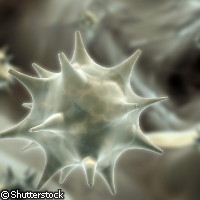EU project hands out prizes for top PhDs
Stronger resistance to drugs and increased tourism which puts people at greater risk of acquiring local diseases are just a couple of factors that play havoc on public health worldwide, and humans are under the constant threat of infections with pathogenic microorganisms. Enter the ERA-NET PATHOGENOMICS ('Trans-European cooperation and coordination of genome sequencing and functional genomics of human-pathogenic microorganisms') project, an initiative of the EU targeting more advanced transnational genome-based research programmes on human-pathogenic microorganisms. ERA-NET PATHOGENOMICS recently announced the winners of the PhD Award 2010 for the most outstanding doctoral theses in this field. The winners, Dr Itay Tirosh from the Weizmann Institute of Science in Israel, Dr Andreja Kovac from the University of Ljubljana in Slovenia, and Dr Cristina Latasa from the Public University of Navarra in Spain, were awarded EUR 2,000 each. Dr Tirosh received the award for shedding light on the evolution of gene expression regulation on a genome-wide scale, while Dr Kovac picked up a prize for searching for and finding compounds that could be used in new antibiotic drug treatments. Dr Latasa was commended for investigating biofilm formation in Salmonella, a pathogen that triggers food poisoning. The PhD Award Ceremony held in Pecs, Hungary in April, is an annual event jointly funded by all partners in the ERA-NET project. 'This year we evaluated eight candidate theses, recommended by the ERA-NET partner national R&D funding bodies, all of which presented high quality and innovative science,' explained Dr Marion Karrasch-Bott from Forschungszentrum Jülich in Germany, who is also the coordinator of ERA-NET PATHOGENOMICS. 'The winners were chosen based on excellence in scientific quality and impact of the work, quality of publications and the theoretical approach underlying the research.' Infections with pathogenic microorganisms are responsible for the deaths of many people worldwide. However, despite growing levels of resistance to drugs, advanced functional genomics technologies have enabled researchers to systematically identify pathogenesis-related genes. In so doing, scientists have identified new targets for diagnostics, therapeutics and prevention. Launched in 2004 and scheduled to end in 2012, ERA-NET PATHOGENOMICS seeks to establish sustained cooperation between national funding bodies and to coordinate their genome-based research programmes on human-pathogenic microorganisms. The ERA-NET is funded to the tune of EUR 3 million under the ERA-NET Scheme of the EU's Sixth Framework Programme (FP6). As well as improving the transparency and coherence of national research programmes, the project team is working to create an internal market for pathogenomics with information exchanges, and to define a European research and training agenda on pathogenomics as part of a European research policy. Besides Forschungszentrum Jülich GmbH (FZJ), the ERA-NET PATHOGENOMICS consortium is made up of the Austrian Federal Ministry of Science and Research, the Austrian Science Fund, the Academy of Finland, the Institut Pasteur and the National Agency for Research, both in France, the Federal Ministry of Education and Research in Germany, the Hungarian Academy of Science, the Hungarian Scientific Research Fund, the Israeli Chief Scientist Office, the Ministry of Health and the Science and Technology Foundation in Portugal, Slovenia's Ministry of Higher Education, Science and Technology, and Spain's Ministry of Science and Innovation.



